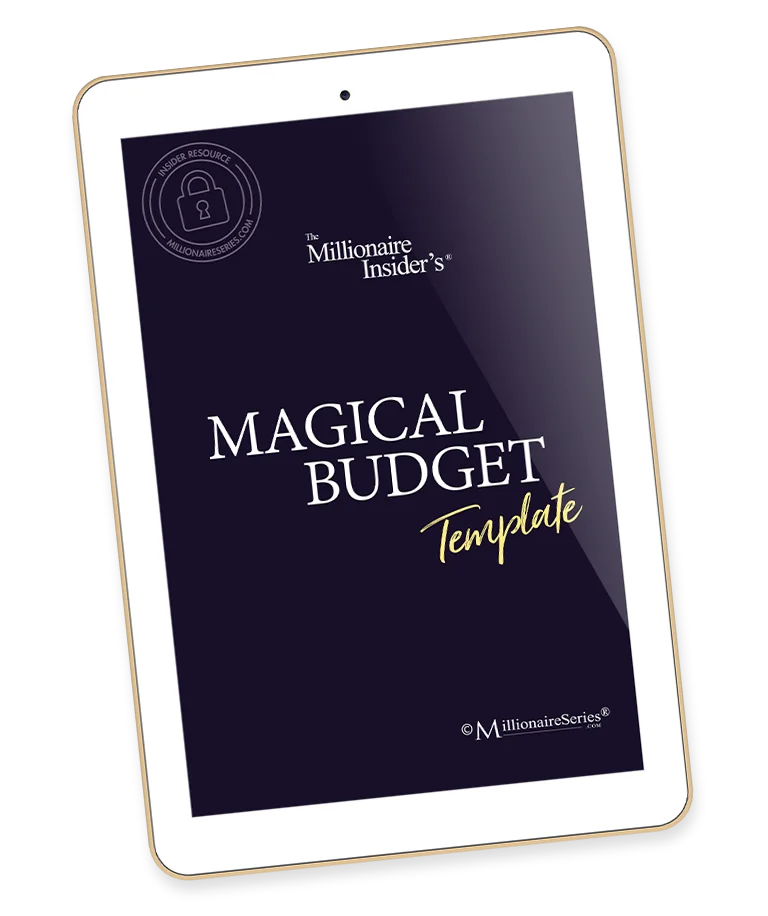Updated December 22nd, 2023.
Introduction – How to Manage Money
A money management plan is an essential tool for our lives. Too often, people ignore their finances until a crisis arises. Effectively managing money is critical to a secure and fulfilling life.
Examples of life events that require money management may include:
- Retirement
- A windfall
- A financial transition such as death or divorce.
In this article, we’ll dive into:
- The core principles of money management
- What is money management
- Why it’s important
- Who can benefit from adopting effective financial strategies
Disclosure
The Millionaire Insider® copyrights all materials and intellectual property.
This information is for educational purposes only. It is not intended to replace the advice of any advisor or specialist, nor to provide investment, financial, tax, retirement, planning, or healthcare advice.
Always consult with a qualified professional before making any financial decisions or changes.
What is Money Management?
At its core, managing money is a process. It includes:
- Budgeting
- Saving
- Investing
- Spending wisely to achieve financial goals
It requires you to make informed decisions. Effective money management includes planning, discipline, and financial literacy.
Create a Spending Plan
Making a budget is the foundation of an effective plan.  A spending plan outlines income, expenses, and savings goals. This helps you understand where your money goes each month.
A spending plan outlines income, expenses, and savings goals. This helps you understand where your money goes each month.
It requires that you track your spending habits and monitor your expenditures. This awareness is the first step toward making informed financial decisions.
Make a Budget
Start by listing all sources of income, including salary and bonuses. Next, categorize expenses into fixed and variable costs.
Examples of fixed expenses include mortgage payments, insurance, and utilities. Variable expenses include entertainment and travel.
Tracking Expenses
Budgeting apps or spreadsheets can help you monitor expenses. Many apps categorize spending automatically. This allows you to see where you are spending money.
Reviewing and adjusting the budget allows you to update it as needed.
Save for Emergencies
Building an emergency fund is a critical component of money management. Life is rarely predictable. For example, you may have unexpected expenses, such as:
- Medical emergencies
- Car repairs
- Tax bills
- Death that requires travel
An emergency fund provides a safety net. This allows you to avoid taking out a loan to cover unexpected expenses.
Set Savings Goals

Establish specific and achievable savings goals. Examples may include:
- Funding college
- Planning for retirement
- Paying off your home
Clear goals can also motivate you to save.
Automate Your Savings
Consider setting up automatic transfers from your checking account to a savings account. This ensures that you save money before you have the chance to spend it.
Invest Wisely
While saving is crucial for short-term financial goals and emergencies, investing is key to building wealth. Investments offer  the potential for higher returns and risk. As a result, they allow you to earn more money than fixed assets.
the potential for higher returns and risk. As a result, they allow you to earn more money than fixed assets.
Understand Your Investment Options
Explore various investment options, such as stocks, bonds, mutual funds, and real estate.
All investments carry risks and rewards. Understanding your risk tolerance and financial goals before investing any money is important. It is also important to consult with a qualified investment professional.
Diversify Your Assets
By properly allocating your assets, you can balance and protect your portfolio. This can also reduce risk.
Why is Money Management Important?

Financial Stability
Effective money management provides financial stability. It helps to ensure that your income covers essential expenses and allows you to save and invest. For many, the result is financial peace and confidence.
Reducing Debt
Living debt-free is priceless for most women. Paying off debt should be a priority. If you can’t pay off all your debt, limit your debt to a mortgage and automobile loan.
Always pay off your higher interest-rate credit cards first. Continue to make the minimum payment on other cards until you have them all paid off.
Proactive money management can help you avoid unnecessary debt. Budgeting and saving can cover expenses without relying on credit cards or loans.
Credit Score Monitoring
Managing your finances positively impacts credit scores. It also makes qualifying for lower interest rates on loans and credit cards easier. A good credit score offers better financial opportunities, from lower mortgage rates to premium credit cards.
Setting and Achieving Goals
Setting short-term and long-term financial goals is a critical step in money management.
Whether funding a child’s education or buying a new home, a financial plan helps make it a reality.
Retirement Planning
Saving and investing with a focus on retirement  is a crucial aspect of managing your finances.
is a crucial aspect of managing your finances.
Investing early allows you to take advantage of compound interest. Compound interest will enable you to earn money on the principal and interest. Over time, it becomes exponential.
Educational Expenses
The cost of education continues to rise. For that reason, planning for it should be a top priority.
Planning can ease the financial burden associated with tuition, books, and other educational costs.
Who Needs Money Management?
Sudden Wealth
Individuals experiencing a life transition generally need money management.
Examples include:
Divorce
If you are getting divorced, you will likely need help managing your finances and money. You will also likely need to complete a financial plan.
Death

If you or a loved one is terminal, you may need guidance with the allocation of your money. This often includes an estate plan to distribute your or their assets.
Inheritance
You will probably need financial support if you receive an inheritance. You may need mental support in addition to financial.
Windfall
You will likely need financial advice when you receive sudden wealth from any source.
It is essential to make your personal finances a priority early in life. It can also be helpful to decide what you will do with any extra money.
Examples may include that you:
- Determine your monthly income
- Create a budget
- Save money
- Invest your assets
Retirement Planning
Your retirement savings plan is critical at any stage of your life.
It is important to review your retirement goals and plan regularly. As your situation changes, you need to adjust your plan. An advisor can help to ensure you are on track to achieving your goals. As a result, you won’t have to worry about running out of money.
Wealth Preservation
As you approach retirement, your focus shifts from growing your assets to preservation.
Estate Planning
Money management extends to estate planning  for retirees.
for retirees.
An estate plan provides for the distribution of your assets.
It involves careful planning, including wills, trusts, and other estate planning tools.
Career Transitions
As people progress in their career, they may consider job changes or other career transitions. Effective money management ensures a smooth transition by providing a financial buffer and risk reduction.
Great Money Management Tips
- Review investment allocations
- Determine a withdrawal plan
- Purchase long-term care insurance
- Review life insurance
- Create a budget
- Downsize your home
- Move to a different state
How to Manage Money Early in Life
Planning for the early stages of a career may be for your child or grandchild. These tips can help those starting on their journey.
Recent Graduates and Young Professionals
Starting a career often comes with financial responsibilities. Establishing sound financial habits early lays the foundation for a secure future.
As you earn more, do your best to save more. This allows you to
- Purchase a home
- Change jobs
- Move to a new city
- Take that dream vacation
- Get additional education
- Save for retirement
- Plan for your future
Building Credit
Young adults often have limited credit history. Money management can ensure you pay your bills on time and use credit responsibly.
This will help you build a credit history essential for future financial endeavors. The financial institution where you have your bank accounts is a good place to start. You can apply for a credit card or ask them how to improve your credit.
Families and Parents

Managing a household involves juggling numerous financial responsibilities, from mortgage payments to children’s education funds. Families and parents need robust money management strategies to ensure financial stability and achieve long-term goals.
Childcare and Education Costs
Raising children is expensive. Examples include childcare, after-school activities, and education costs. Money management allows parents to plan for these expenses. It also provides a secure financial future for you and your children.
Homeownership
Homeownership is a significant financial goal. Over the last few years, it has become expensive.
Examples include saving for a down payment, securing a mortgage with favorable terms, and managing ongoing homeownership expenses.
Conclusion – How to Manage Money
Money management is a critical skill that impacts most people regardless of age, profession, or financial status.
You may need support with the management of your assets.
Examples include a windfall, a financial transition such as divorce, end of life, retirement planning, or an inheritance.
Managing money is essential if you or a family member are a recent graduate or a mid-career professional. It provides financial stability, debt reduction, goal achievement, and peace of mind.
By adopting effective money management practices, individuals can confidently navigate financial complexities and build a secure and fulfilling future.
Click the video to watch.
3 Critical Insights to How to Manage Money

In this video, you will learn how to build more and effectively manage wealth.
In addition, you will get access to what I discovered from years of advising and researching millionaires.
You will also learn:
- Money tips to manage your finances
- The best way to save money and avoid consumer debt
- Creating your plan to achieve financial peace and freedom
- Easy ways to save money and grow your net worth
- How to achieve your financial goals and dreams
- The secret to creating your budget (regardless of your situation)
- How wealthy people manage their money differently than others
- The best wealth strategies that they do not teach in school (This is a game changer.)
- How to manage money (even if it not your favorite thing)
- What wealthy people do differently than others when it comes to handling their finances
- How to avoid high-interest loans by managing your money
- What wealthy investors do differently with their finances and debt
Click here to get your free financial checkup:
Here is the link to watch today’s episode: “Managing Your Finances”
To living fulfilled and wealthy,
Annette

